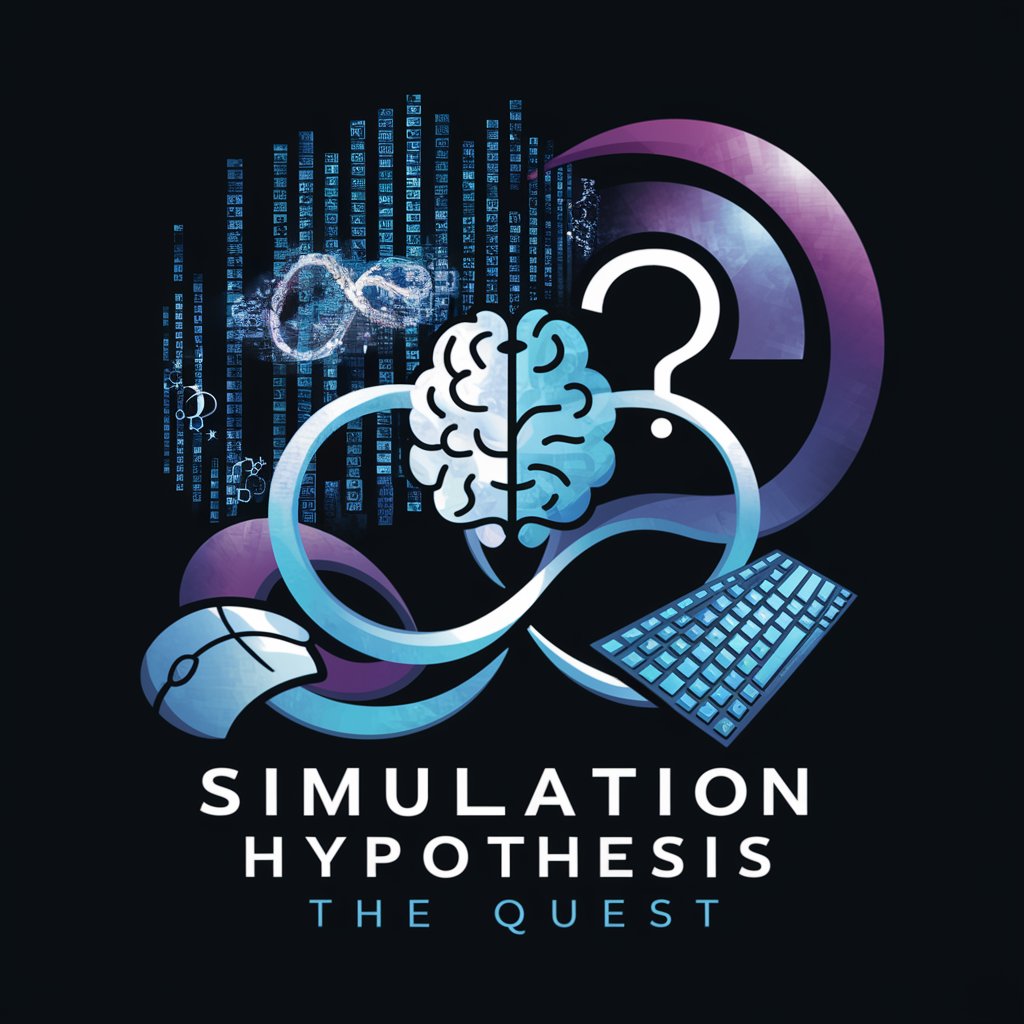Simulation Hypothesis: The Quest - Interactive Simulation Game

Welcome, seeker. Ready to explore the depths of reality?
Explore Simulated Realities, Challenge Your Perception
Imagine waking up in a world where...
As you delve deeper into the simulation, you notice...
In this scenario, you must determine whether...
During your philosophical debate, a character challenges you with...
Get Embed Code
Introduction to Simulation Hypothesis: The Quest
Simulation Hypothesis: The Quest is an immersive adventure game designed to explore the concept of simulated reality through narrative-driven gameplay. Players are thrust into a world where the lines between digital and physical blur, engaging in philosophical debates, scientific explorations, and reality-testing puzzles. The game is structured around the intriguing question of whether our reality is a sophisticated simulation. For example, players might find themselves in a virtual city where anomalies suggest the fabric of reality is editable, leading to tasks where they must manipulate their environment or debate with AI characters espousing different philosophical views on reality. Powered by ChatGPT-4o。

Main Functions of Simulation Hypothesis: The Quest
Reality Testing
Example
Players may use a tool within the game to measure 'glitches' in their environment, akin to testing for pixelation or inconsistencies in a digital image.
Scenario
In a scenario mimicking a quantum lab, players conduct experiments to reveal if physical laws hold or if anomalies suggest a simulated construct.
Philosophical Debates
Example
Engaging with a character who argues from a solipsistic perspective, challenging the player's understanding of consciousness and existence.
Scenario
Within a virtual Athenian forum, players debate the nature of reality with AI philosophers, using logic and ethical considerations to defend the simulation hypothesis.
Scientific Exploration
Example
Investigating quantum mechanics to understand how the underlying principles might support the simulation theory.
Scenario
Exploring a virtual CERN-like collider environment, players unlock insights into particle physics that hint at the digital fabric of their universe.
Ideal Users of Simulation Hypothesis: The Quest
Philosophy and Science Enthusiasts
Individuals fascinated by existential questions and the nature of reality, seeking a platform to explore these concepts interactively.
Gamers and Tech Aficionados
Tech-savvy players looking for a game that offers more than entertainment, providing a thought-provoking experience that challenges perceptions of reality.
Educators and Students
Teachers and learners in fields related to philosophy, physics, and computer science, who can use the game as a tool to illustrate complex concepts in an engaging manner.

Getting Started with Simulation Hypothesis: The Quest
1
Begin by accessing the platform at yeschat.ai for an immediate trial, no sign-up or ChatGPT Plus required.
2
Choose the 'Simulation Hypothesis: The Quest' game mode to immerse yourself in a narrative-driven adventure exploring simulated realities.
3
Familiarize yourself with the game mechanics, including puzzle-solving, philosophical debates, and reality testing to enhance your gameplay.
4
Engage with the game's dynamic scenarios and characters, using the clues and philosophical insights provided to navigate through the simulated world.
5
Utilize the in-game tools and forums for reality testing and philosophical discussions to deepen your understanding and experience of the game.
Try other advanced and practical GPTs
Amantius Website
Empower Your Web Presence with AI

CruxGPT
Empowering Creativity with AI

We Bring the Party Canada
Crafting Magical Event Experiences with AI

Character Creator: Character Sheet
Craft Detailed Characters with AI

Character Creator: Visual Identity
Bringing Characters to Life with AI

Slogan
Crafting Catchy Slogans with AI Power

Biz-Wiz
Empowering Decisions with AI-Powered Insights

SofiGPT
Empowering Strategies with AI

Major Sorting Hat
Discover Your Path with AI

Internal Audit and Risk Management GPT
AI-Powered Audit and Risk Insights

WP Assistant
Empowering WordPress Development with AI

WP Wisdom
Elevating WordPress with AI

Frequently Asked Questions about Simulation Hypothesis: The Quest
What is Simulation Hypothesis: The Quest?
It's an interactive, narrative-driven game that explores the concept of simulated realities, engaging players in puzzles, debates, and adventures to question the nature of their existence.
How does the game simulate different realities?
The game uses dynamic reality generation, creating immersive scenarios that mimic various philosophical and scientific concepts, challenging players' perceptions of reality.
Can players influence the game's storyline?
Yes, the game features adaptive storylines that evolve based on players' choices and discoveries, offering a unique experience for each user.
Are there any community features in the game?
The game includes a philosophical forum where players can engage in discussions and debates about the simulation hypothesis and related theories, fostering a community of inquiry.
What tools are available for reality testing within the game?
Players have access to interactive tools designed to conduct experiments and tests within the game's environment, enhancing the immersive experience and engagement with the game's themes.
